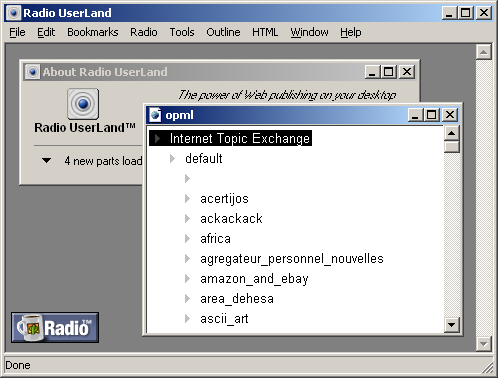bzero 0.17 released
OK guys, bzero 0.17 is here. Get it from the usual place!
Lots of stuff has happened since 0.16; here's the bit from the changelog:
* Added another troubleshooting note to the docs, and added python2.2-xmlbase to the list of Debian packages to install.
* b0lib/archive.py added to distribution. (Oops.)
* Added more newlines to the end of template files, to make Doug Landauer happy.
* Changed URL for Second p0st in the default blogroll and docs.
* Now you can put an 'upstreamFolderUrl' attribute under the <blog/> element in auth.xml and have bzero use that to generate permalinks. This means you can use rsync or ftp or something to store your blog on a normal web server and also upstream to a community server, without having to have permalinks generated by the community server.
* Changed RSS template to not put in real e-mail addresses (because I've been getting _far_ too much spam from my Radio and bzero RSS files!)
* Added 'sendsearch' command-line option, to send post information for the whole blog to a search engine.
* Added 'fsdump' command-line option, to dump out a blog into a format that hopefully anybody can read.
* Added 'recent' command-line option, to list filenames of recent posts (to make it easy to edit them).
* Added 'editroll' command-line option, to bring up blogroll.py in the editor.
... more like this: [bzero]
... topic exchange: [bzero]
Lots of stuff has happened since 0.16; here's the bit from the changelog:
* Added another troubleshooting note to the docs, and added python2.2-xmlbase to the list of Debian packages to install.
* b0lib/archive.py added to distribution. (Oops.)
* Added more newlines to the end of template files, to make Doug Landauer happy.
* Changed URL for Second p0st in the default blogroll and docs.
* Now you can put an 'upstreamFolderUrl' attribute under the <blog/> element in auth.xml and have bzero use that to generate permalinks. This means you can use rsync or ftp or something to store your blog on a normal web server and also upstream to a community server, without having to have permalinks generated by the community server.
* Changed RSS template to not put in real e-mail addresses (because I've been getting _far_ too much spam from my Radio and bzero RSS files!)
* Added 'sendsearch' command-line option, to send post information for the whole blog to a search engine.
* Added 'fsdump' command-line option, to dump out a blog into a format that hopefully anybody can read.
* Added 'recent' command-line option, to list filenames of recent posts (to make it easy to edit them).
* Added 'editroll' command-line option, to bring up blogroll.py in the editor.
